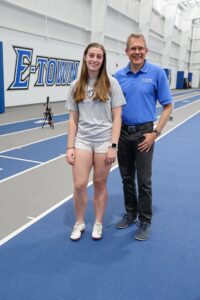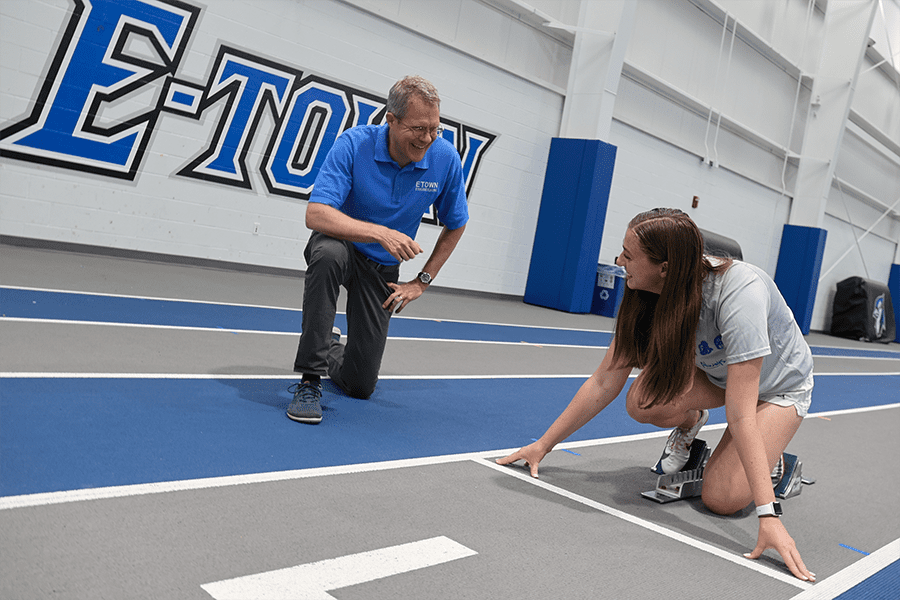Elizabeth town College Computer Science major and sprinter for the Women’s Track & Field team, Melissa Patton ’25 is combining two passions through research on campus to identify the optimal sprint start for track runners.
town College Computer Science major and sprinter for the Women’s Track & Field team, Melissa Patton ’25 is combining two passions through research on campus to identify the optimal sprint start for track runners.
Patton and faculty mentor, Professor of Engineering & Physics Kurt DeGoede, are using an open-source software developed at Stanford University, OpenCap to record and process 3D motion capture data as part of the Summer Creative Arts and Research Program (SCARP).
Title of Research
Biomechanical Analysis of an Optimized Sprint Start
Student Researcher
Melissa Patton ’25 (Computer Science major)
Faculty Mentor
Dr. Kurt DeGoede, Professor of Engineering & Physics
What are you researching?
Patton: My research focuses on identifying a more precise optimal range for track block setup. Previous studies have indicated the existence of such a range of foot pedal setup which is better than others, and my project aims to refine this range further based on the data that I gather. To conduct the study, I plan to use a software called OpenCap, along with four iPads to record track starts. The captured video footage will then be processed through OpenSim software, which will provide comprehensive biomechanical data for each start. Later in the summer, we intend to test subjects and use the data from OpenSim, which will be analyzed in a custom Python program to hopefully draw definitive conclusions.
Why did you choose this topic?
Patton: I have always been curious about the research behind block starts as a captain on the Women’s Track & Field team at Etown. At track practice, there are always a lot of opinions, so I wanted to see how much of the research supported these opinions and if I could find a more optimal way to help myself and my teammates.
What was the most interesting aspect of this research?
Patton: Learning new things about blocks I didn’t know that could help myself and my teammates get better.
What are you hoping to accomplish through this research project?
Patton: I hope to draw conclusions about blocks that people will benefit from.
Talk about working with your mentor. How have they helped you throughout this experience?
Patton: Dr. DeGoede has been a valuable mentor throughout this project. Since I come from a background with limited biomechanics knowledge, he has guided me through the essential concepts needed for this work. Moreover, he has instructed me on how to use the various software tools required to successfully complete this project.
Hear from the faculty mentor — Kurt DeGoede
“In a sport where every 1/100th of a second matters, optimizing every aspect of your technique is vital. Melissa has identified a couple of open questions that do not have empirical measurements to support coaching strategies. Beyond the specifics of this experiment, I see Melissa’s work as a first in a long line of projects allowing student-athletes, or others interested in a particular sport, to pose and test hypotheses related to their sport. These cross-disciplinary studies merge engineering-biomechanics, exercise science, data analysis, physical therapy, and physiology. I am excited to see the future projects inspired by what Melissa will accomplish this summer.”

